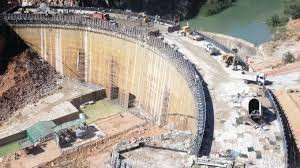
RESIDENTS of Muzarabani are brimming with optimism as the US$270 million Mbada Dam project gains momentum, promising to transform the dry but fertile region into a thriving greenbelt and catalyst for rural development.
Spearheaded by the government under the Public Sector Investment Programme, the dam is expected to usher in a new era of agricultural productivity, clean energy and improved water supply.
The project recently drew the attention of Special Adviser to the President on Monitoring and Implementation of Government Projects, Joram Gumbo, who toured the construction site and emphasised the national significance of the dam.
“It is an important project not just for this community, but for the whole country,” Gumbo said.
“It will enhance water supply to nearby communities, improve food security, and boost economic activity in Centenary.”
The Zimbabwe National Water Authority is overseeing the engineering aspects of the dam.
According to Gumbo, the project exemplifies government’s commitment to inclusive development and must receive adequate funding to stay on schedule and meet its vast potential.
Traditional leaders in the area have thrown their full support behind the initiative.
- Water shortages hit Gutu-Mpandawana
- Power cuts hit Karoi water supplies
- Fire destroys city flats
- New water policy brings less sharing, more spying
Keep Reading
Chief Chiweshe confirmed that the necessary traditional rites have been conducted to ensure the project’s spiritual and cultural harmony.
“As traditional leaders, we fully support the dam construction,” Chief Chiweshe said.
“This is the kind of development we desire for our people, one that aligns with the government’s broader vision of rural transformation and economic empowerment.”
Once completed, the dam will provide irrigation for 15 000 hectares across Muzarabani district, generate hydropower and supply clean drinking water to nearby Centenary town a multifaceted development that residents believe will reshape the local economy.
Mbada Dam was allocated ZiG36 million in the 2025 national budget, reinforcing government’s dedication to the project’s timely completion.
As construction progresses, hopes remain high that this landmark project will turn Muzarabani into a beacon of rural resilience and agricultural revival.










